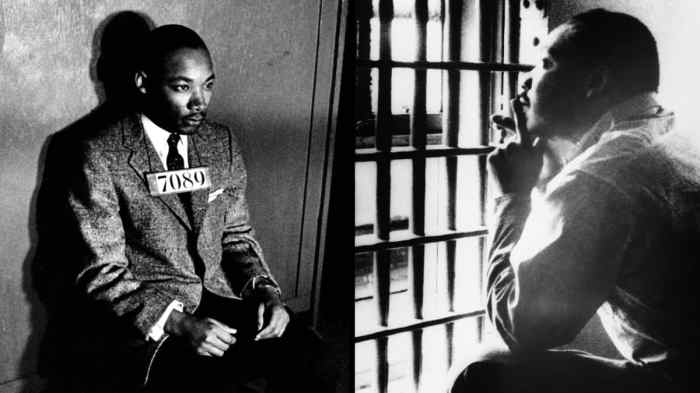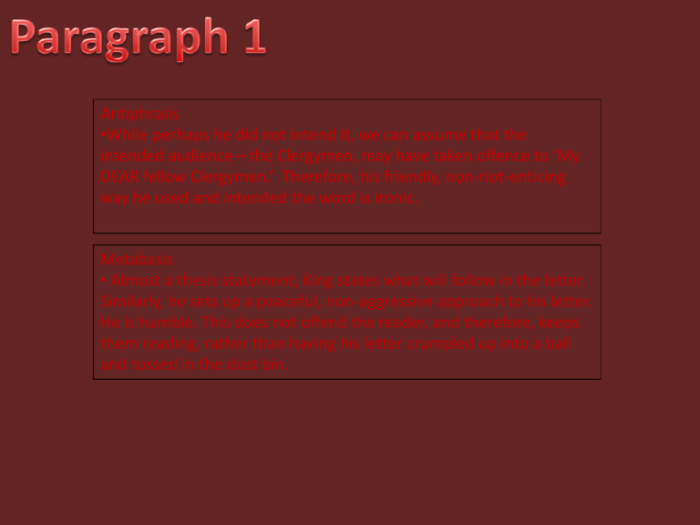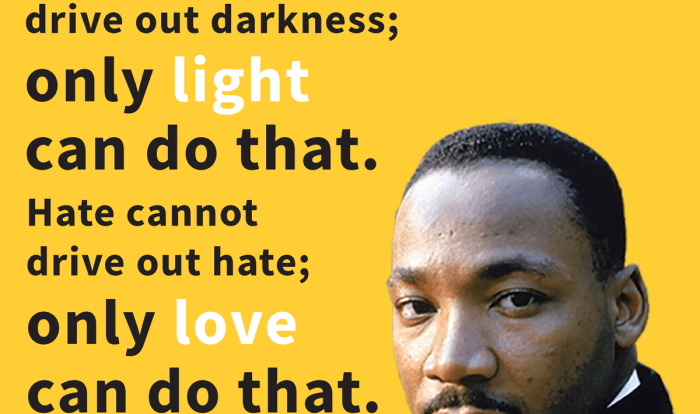Simile in letter from birmingham jail – In Martin Luther King Jr.’s iconic “Letter from Birmingham Jail,” similes serve as powerful rhetorical tools, enhancing the emotional and persuasive impact of his message. This analysis delves into the significance and artistry of these literary devices, exploring their role in conveying the author’s arguments and shaping the reader’s understanding.
King’s use of similes goes beyond mere embellishment; they become integral to his rhetorical strategy. Through vivid imagery and relatable comparisons, he connects with his audience on a deeply personal level, evoking empathy and reinforcing his call for justice.
1. Definition and Introduction

A simile is a figure of speech that compares two unlike things, using the words “like” or “as.” Similes help create vivid imagery and enhance the impact of language.
Examples of similes include: “Her eyes sparkled like diamonds,” “He was as strong as an ox,” and “Life is like a box of chocolates.”
2. Similes in “Letter from Birmingham Jail”: Simile In Letter From Birmingham Jail

Martin Luther King Jr. effectively employs similes in his “Letter from Birmingham Jail” to convey his message and persuade readers.
- “I was as deeply moved as the rest of the nation by the burning and looting of the Birmingham church.”
- “Like Paul, I must constantly respond to the Macedonian call for aid.”
- “Justice too long delayed is justice denied, like a meal too long postponed is a meal denied.”
3. Rhetorical Analysis of Similes

King’s use of similes enhances the persuasive power of his letter through several rhetorical devices:
- Pathos:Similes evoke emotions by creating relatable comparisons, appealing to the reader’s empathy.
- Logos:Similes provide logical connections by drawing parallels between different concepts, making arguments more compelling.
- Ethos:Similes establish King’s credibility by demonstrating his ability to craft vivid and effective language.
4. Comparative Analysis

The use of similes in “Letter from Birmingham Jail” can be compared to other works of literature, such as:
- The Bible:King draws parallels to biblical figures and events, enhancing the religious significance of his message.
- Shakespeare’s plays:Shakespeare’s extensive use of similes enriches his language and conveys complex emotions.
5. Impact on the Reader
King’s similes create a powerful emotional and intellectual impact on the reader:
- Emotional:The vivid comparisons evoke strong feelings, such as empathy, anger, and hope.
- Intellectual:The logical connections help readers understand the complexities of social injustice and the urgency of addressing it.
Helpful Answers
What is the purpose of similes in “Letter from Birmingham Jail”?
Similes in the letter serve to enhance the emotional impact, clarify complex ideas, and make the arguments more relatable and persuasive.
How do similes contribute to the rhetorical power of the letter?
Similes create vivid imagery, evoke empathy, and reinforce the author’s message, making it more effective in persuading the reader.
